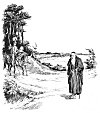
Click to enlarge
After his victory over Falsehood, the Red Cross Knight again mounted his steed, and he and the Lady Una went on their way. Keeping carefully to one path, and turning neither to the right hand nor the left, at last they found themselves safely out of the Wood of Error.
But now they were to fall into the power of a more dangerous and treacherous foe than even the hateful monster, Falsehood.
They had travelled a long way, and met with no fresh adventure, when at last they chanced to meet in
the road an old man. He looked very wise and good. He was dressed in a long black gown, like a hermit, and had bare feet and a grey beard; he had a book hanging from his belt, as was the custom with scholars in those days. He seemed very quiet and sad, and kept his eyes fixed on the ground, and all the time, as he went along, he seemed to be saying prayers, and lamenting over his own wickedness.
 Click to enlarge |
"Ah, my dear son!" said the hermit, "how should
a simple old man, who lives in a lonely cell, and does nothing all day but sorrow for his own faults-how should such a man know any tidings of war or worldly trouble? It is not fitting for me to meddle with such matters. But, if indeed you desire to hear about danger and evil near at hand, I can tell you about a strange man who wastes all the surrounding country."
"That," said the Knight, "is what I chiefly ask about, and I will reward you well if you will guide me to the place where he dwells. For it is a disgrace to knighthood that such a creature should be allowed to live so long."
"His dwelling is far away from here, in the midst of a barren wilderness," answered the old man. "No living person may ever pass it without great danger and difficulty."
"Now," said the Lady Una, "night is drawing near, and I know well that you are wearied with your former fight. Therefore, take rest, and with the new day begin new work."
"You have been well advised, Sir Knight," said the old man. "Day is now spent; therefore take up your abode with me for this night."
The travellers were well content to do this, so they went with the apparently good old man to his home.
It was a little lowly hermitage, down in a dale by the side of a forest, far from the beaten track of travellers. A small chapel was built near, and close by a crystal stream gently welled forth from a never-failing fountain.
Arrived at the house, they neither expected nor found any entertainment; but rest was what they chiefly needed, and they were well satisfied, for the noblest mind is always the best contented. The old man had a good store of pleasing words, and knew well how to fit his talk to suit his visitors. The evening passed pleasantly, and then the hermit conducted his guests to the lodgings where they were to spend the night.
But when they were safely asleep a horrid change came over the old man, for in reality he was not good at all, although he pretended to be so. His heart was full of hatred, malice, and deceit. He called himself Archimago, which means a "Great Magician," but his real name was Hypocrisy. He knew that as long as Holiness and Truth kept together, no great harm could come to either of them; so he determined to do everything in his power to separate them. For this purpose he got out all his books of magic, and set to work to devise cunning schemes and spells. He was so clever and wily that he could deceive people much better and wiser than himself. He also had at his bidding many bad little spirits, who ran about and did his messages; these he used to help his friends and frighten his enemies, and he had the power of making them take any shape he wished.
Choosing out two of the worst of these, he sent one on a message to King Morpheus, who rules over the Land of Sleep. He bade him bring back with him a bad, false dream, which Archimago then carried to the sleeping Knight. So cunningly did he contrive the matter, that when the Knight awoke the next
morning he never knew that it had only been a dream, but believed that all the things he had seen in his sleep had really happened.
In the meanwhile, Archimago dressed up the other bad spirit to look like Una, so that at a little distance it was impossible to tell any difference in the two figures. He knew that the only way to part Holiness and Truth was to make Holiness believe by some means that Truth was not as good as she appeared to be. He knew also that the Red Cross Knight would believe nothing against the Lady Una except what he saw with his own eyes. Therefore he laid his plans with the greatest care and guile.
Now we shall see how he succeeded in his wicked endeavour.